#and for any practicing christian or catholic out here
Explore tagged Tumblr posts
Text
this year's christmas makes me sick. it's not just the social obligations one has to live up to, that happens every year, but i woke up today and realized that as i get older and material gifts matter less and less to me, it makes me sick just how christmas has been so desentisized to the point that we have the guts, the outright shame, to be jolly and merry and be grateful for our "blessings" when the world is on fire.
and i want to specify that the christmas that makes me sick is the christian catholic christmas. my faith pushes me to be shameful for how we treat christmas now. not once have i heard a priest, during their homilies, mention anything about the ongoing genocide.
is not the nativity a daily scene everyday anywhere in the world where peoples are displaced from their homes, from their land?
is not the savior and the holy family that we celebrate one of the humblest of origins precisely because they're the least in society?
do we have the audacity to blaze fireworks when across the world, a child is terrified of explosions, is dead because of explosions, is an orphan in the rubble?
it punches me in the gut when the social media bubble is filled with celebrations, statements of thanks for the blessings and material wealth one has received in the year, when one takes the name of god of jesus and praises them so emptily so selfishly.
we don't have the shame.
sure, no amount of wallowing in grief and helplessness can miraculously make everything better. that i can be told of to just be happy and celebrate and enjoy my holidays whatsoever.
but how much does it take to remember, to acknowledge, to spend a prayer for everyone and anyone suffering right now?
is christianity just this? desensitized parties, vain praise and worship songs, consumerism and more of it?
#if you read this you have my thanks#really i just needed to let this out#and for any practicing christian or catholic out here#tell me i'm not going crazy#sel.txt
3 notes
·
View notes
Text
marauders characters’ ethnicities/religions/languages
just my own HCs so don’t get offended!
jayaram fleamont potter
(tells people to call him j or jamie bc its easier, so everyone assumes his real name is james, and he doesn’t correct them)
indian hindu on his mum’s side (tamil nadu specifically)
effie comes from a rich tamil pureblood family (many pureblood families name their children something greek/latin, thus ‘euphemia’), and teaches jamie hindi, tamil and some greek
his tamil is great and he’s fluent in writing/reading as well as speaking, writing letters to effie from hogwarts in tamil
his hindi is okay, mostly with reading and talking, his writing is pretty limited
his greek is godawful and he’s barely conversational, much to effie’s dismay
(non-practicing) catholic chilean on his dad’s side
monty is (obviously) a potter, and most of his relatives live in chile or south america, but his parents moved to england for hogwarts (didn’t want him going to school on another continent to them)
he’s a practicing hindu with his mum (monty doesn’t really get it because he doesn’t speak a word of hindi so he just smiles and nods)
he speaks english and (chilean) spanish, which he teaches jamie, who speaks/reads/writes it as fluently as his english and tamil
sirius orion black
he is heir of the noble and most ancient house of black so he’s the french-est pureblooded-est guy you’ll ever meet
especially pureblooded because he’s the product of incest (his parents are second cousins) (canon)
the black family are french, owning many estates there, etc., but have lived in england for generations (his great-grandparents migrated and now they only visit france in the summer sometimes)
catholic (receiving NOO criticism here bc this is canon (no its not)) with intense religious trauma and internalised homophobia (not projecting at all whaaaaat)
sort of converts to judaism (ish?) he makes remus explain it all and siri thinks its sooo fascinating so he gets a menorah for the dorm for hanukah and buys a torah to study and remus is so happy
speaks french as his first language, and latin and greek fluently from tutoring, but only started to learn english for hogwarts (is so bad at it in first year omg)
remus yohanan lupin
(I KNOW HIS CANON MIDDLE NAME IS JOHN BUT HE IS SO JEWISH CODED TO ME SO HERE’S THE HEBREW FORM OF JOHN INSTEAD X)
polish-jewish on his dad’s side (lyall was evacuated to wales in ww2, when he was about 10, and hope’s parents looked after him until he graduated hogwarts and started dating hope (they literally adored him and helped raise remus I DONT CARE))
protestant welsh on his mum’s side (didn’t really practice her faith though - just brought them all to church on christmas eve and easter sunday)
interfaith household + being a patrilineal jew (more not fitting in angst for remus guys!)
spoke english and welsh at home, equally fluent (lyall picked up welsh while living with hope’s parents), and hebrew too from his hebrew sunday school
lyall tried (and failed) to teach him polish, as that was his first language, so remus can speak a very basic amount of polish, mostly swearing and children’s lullabies (marlene teaches him more at hogwarts so they can gossip!)
not very orthodox jews, but celebrate jewish holidays and go to the synagogue on sabbath (and he wears a necklace of the star of david that belonged to lyall’s late mother)
pieter daan pettigrew
(anglicised his name for hogwarts because everyone called him p-eye-ter (like actual pie + ‘ter’))
protestant dutch on his mum’s side (but she went to hogwarts!)
protestant english on his dad’s side
parents were ‘born again’ christians so they were very devout (grace before every meal, helping out at church every sunday, bible study every morning, etc)
peter never really believed in any of it, and would often go to jamie’s to avoid having to go
he spoke english with his dad and half-brother, but solely dutch with his mum and his other siblings. he was also taught latin before hogwarts (pureblood things) and absolutely HATED it (he was probably dyslexic and often found himself changing language in the middle of his talking exams)
picked up a fair bit of tamil from jamie and effie (aka his second mum) and absolutely LOVED the potters’ diwali party (literally the highlight of his year)
let me know any other characters i should do!! and if you disagree feel free to leave your HCs in the comments, but please respect that people have different opinions xx
#marauders#james potter#indian james potter#latino james potter#hindu james potter#sirius black#french sirius black#catholic sirius black#remus lupin#jewish remus lupin#welsh remus lupin#wolfstar#remus x sirius#peter pettigrew#dutch peter pettigrew#catholic#hinduism#jewish#protestant#religious trauma#please don’t take these too seriously guys its just fun#dont cancel me#headcanon#harry potter#religion#ethnicity#language
83 notes
·
View notes
Text
speaking of "getting into christianity" from that grimes tweet from that post I just reblogged, I have a funnyish story from my fiance re a convo he had with my mom over christmas that is sooo revealing about religious folks and how they don't really believe that people who don't believe in god don't believe in god. let me explain:
I got this second hand from him, but my fiance was talking to my parents and somehow religion came up. my parents are practicing catholics, go to church, yadda yadda. my fiance graciously said something to the effect "I'm glad you guys were able to find community after moving here through your church, and I'm glad it can bring something positive to people, but it's not for me" and my mom said "well I think you should give it a try." now if you knew my mom, you'd know that this was like...like a kindly suggestion. not aggressive. she often says dumb ass things out of love with no real understanding of what she says. but the point I'm making now is that you can only think this makes sense to say if the core concept behind "I don't believe in god" is actually a belief in god. It's like they don't get it. You can't not believe in god, you only say that because you don't like god, or think he's uncool, or inconvenient, or whatever. You want to piss off your parents. You don't want to think about morality. You are rejecting god intentionally, rather than intentionally having a philosophy that does not require a god to exist in any form, whatsoever.
how do you "try" religion if you do not hold the fundamental belief of it. it's literal dogma. Sure, I can "try" going to church just for community, and "try" participating in it hollowly just to get the benefits, but shouldn't that be, like, offensive? if you truly believe in the dogma and theologies of that religion? But to people like my mom, I guess that doesn't matter because you would just manifest a belief in god? or doing the motions is good enough? or it's ego soothing for her (and she does suffer from main character syndrome lol)? I just find it so funny to think about. They can't conceptualize that "I don't believe in god" in the exact same way "I don't believe in Santa Clause" or "I don't believe in a 600 foot serpent wearing a birthday hat and playing a kazoo is curled around the earth's core." It's like they just don't get it lol. Probably because if they allowed themselves to get it, they would instantly...start realizing how bomb and cool and easy it is to just be like "oh yeah who cares about all that" lol.
74 notes
·
View notes
Text
MUSUTAFU in my mha dr
now playing...black list - hime
AKA; the devils resort

GEOGRAPHY
"when i hear that song, i wanna be with you"
musutafu (MST) prefecture is an island off the southern coast of japan located in the phillipine sea. its about 500-800km away from honshu, has 25,000 mi of land and is home to 35.3 million people. MST houses the most biodiverse tropical rainforest in japan (and one of the three most biodiverse in asia) which covers the entire island. MST has mild winters and minimal snow. it rarely reaches under 60/50 degrees F (10/15C?). both summer and spring are extremely humid.
HISTORY
"buffalo soldier, dreadlock rasta"
i never script colonialism clean out, i just make it different. because im always like wait if we dont have colonialism why tf are so many people speaking european languages? makes no sense right? anyways heres how it worked (in all of my DR's btw); europeans had very little power & money compared to locals who integrated with the culture (including locals of european descent) and it was more of a "leader in name" thing. in actuality, colonialism was more similar to a trade partner agreement with colonies, and colonies themselves were very hard to keep--and usually made more money and had more clout than their european counterparts. MST had this situation with spain, england and portugal. as it was an island (and a rather big one) it was already very cut of from japan culturally, economically & socially. so when the mainland went in seclusion for the meiji restoration, the europeans had already gotten full access to MST.




CULTURE
"90 degress inna the shade, temperature tun up"
linguistics the standard language is a portuguese-spanish-tagalog-japanese fusion? and more japanese dominant. no fucking clue how thatll sound.
diversity MST is very racially & ethnically diverse, with a steady flow of immigrants from all over the world. a few prominent origin points include ; south east asia, central america, the carribbean, usa, western europe, south america, taiwan and india. but of course there are many more. the natives are pretty racially diverse as well, about half of the japanese population is "afro-japanese" which is genetically similar to aetas or melanesians.
motorsports drag racing is fully decriminalized and extremely normal. so much so that entire tournaments and elaborate race tracks are built to encourage it. (partially because of the tourism it brings) but before you can do any drag racing you need a permit or license. its very normal for celebrities and heroes to drag race, theres even a yearly competition for celebrities.
lifestyle lazy, indulgent and leisurely. days are spent relaxing at a beach, vibing at a local cookout or shopping. were very friendly, open and relaxed. its a city with very big & bold personalities. most people are ambiverts and its cartoonishly easy to make friends. unfortunately the culture can be a little shallow at times.
beauty standard few are fussy on beauty standards but a visible sun tan is universally preferred. however theres two big rules: no fake tanning under any circumstance & never tan more than two shades darker. in terms of body types, both men & women with toned bodies and "nice" asses are attractive--but for women the addition of being curvy is preferred.
religion among the japanese population the most practiced religion is catholism. this branch of catholism is very heavily mixed with shintoism & buddhism though.
mardi gras/carnaval the prefectures biggest holiday. its both the best and the worst. the sense of community is a focal point, millions of people celebrating and having fun (including the sizable portion of non-christians). everywhere is packed, music is blasting and half the city is drunk and/or high. by night everyone forgets how to act. surely the busiest day for MST based heroes.


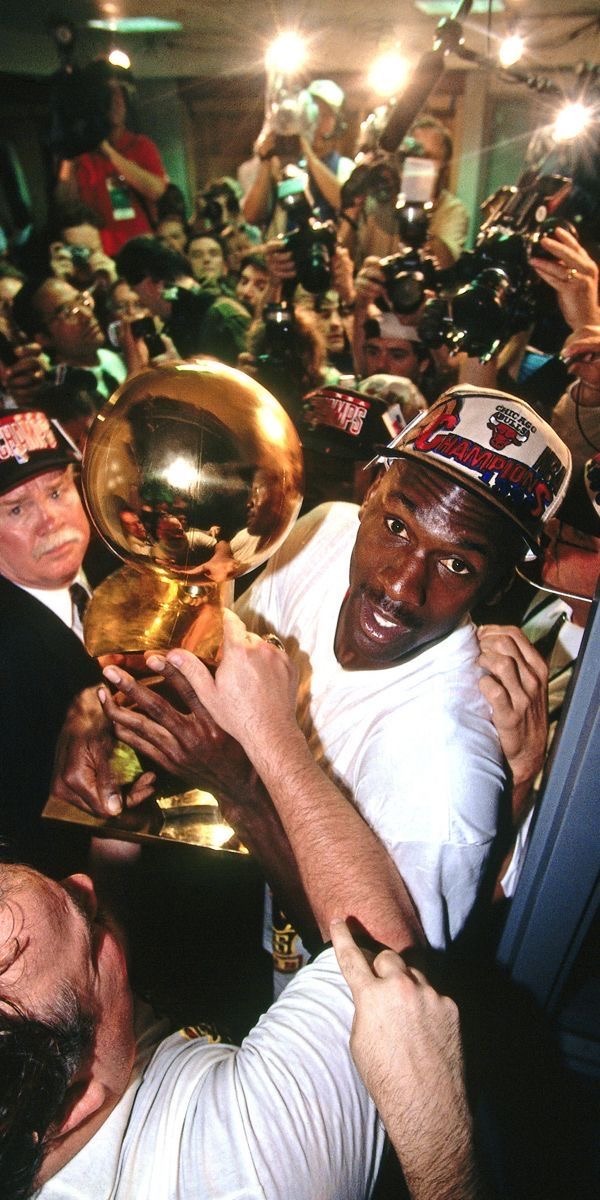

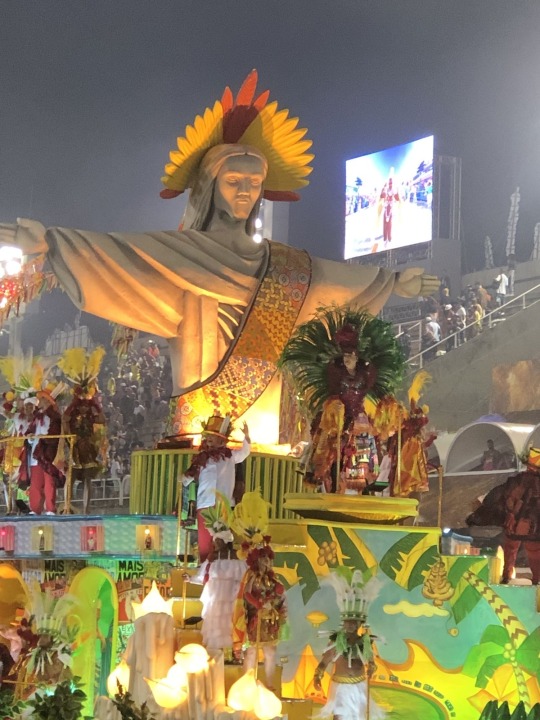
MUSUTAFU CITY DISTRICTS (16 total but im only writing for 4)
"on an island in the sun, we'll be playing and having fun"
the beach durrr the city has a ton of beaches, but this one is the most iconic, large and populated. its right in front of the cities biggest shopping center (what is basically our equivalent of times square...but not as dirty or ghetto). theres always people at this beach, hanging out, on a work break or at a cookout.
the ghetto about 2-3 districts are classified as ghettos. they have an extremely high crime rate, but low quality of life, income & rent. expect seas of street vendors, houses stacked on eachother, music playing all through the night and walls panted with street art. (urarakas district 😍)
the islands a fifteen island archipelago off of the cities coast. considered middle class or lower middle class. life in the islands is slow and easy going. many people work in agriculture or fishing so its known for food & open air markets. the islands have a fun nightlife scene but its generally more laid back. (my district)
rural district the largest district in the city. known for its rich traditional japanese culture, the abundance of natural marijuana and nature. the district is very sparsely industrialized, especially compared to the rest of the city, so its mostly jungle/rainforest. theres also so much wildlife there! and disturbingly large roaches. something cool about it is this biiig ass gate surrounding the whole district! (todoroki family's district)
all districts have a fair share of mongrels / stray dogs. many people take them in to "guard" the house, or just to care for them
people from the islands like to have cute lil sea animal mailboxes!




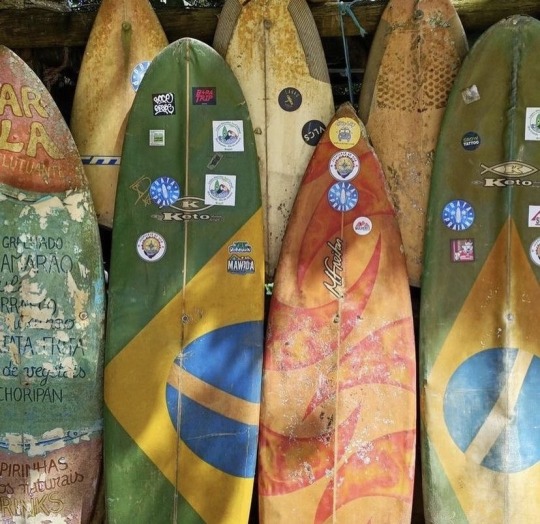
KNOWN FOR
"as i recall i know you love to show off"
love for sports. soccer, basketball, volleyball, baseball & surfing are extremely popular (among both genders)
lots of the population has a shopping addiction
elaborate heists.
trashy reality tv.
big film / tv industry.
high crime rate.
musutafuans want to go to the beach like every fucking day.
really good music.
clubs, casinos, nightlife in general.
beautiful beaches. white sand & clear blue water.

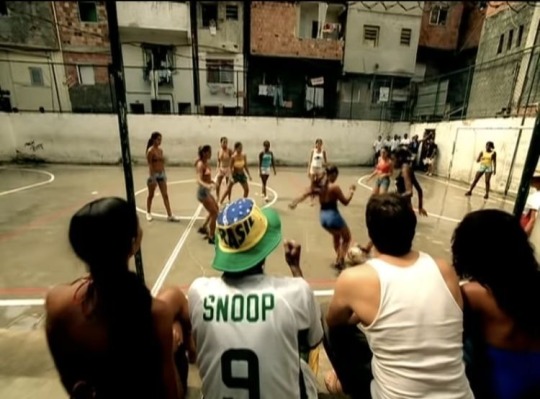

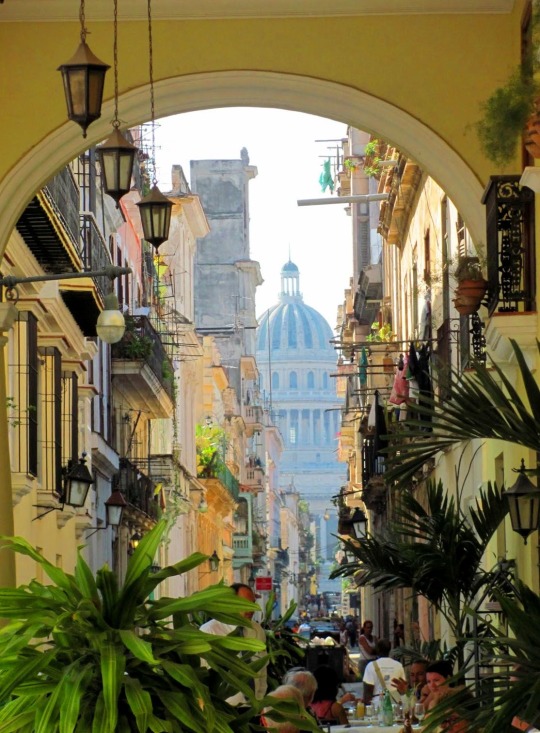

POP CULTURE
"aserejé, ja, dejé"
GTA game based on MST
love & hip hop: MST
brazilian funk, rnb, afro beats, amapiano, dancehall, reggae, dembow, reggaeton and rap are really popular. way more than non japanese/latin pop music
real housewives of MST
we have golden crust, jollibee, mama empanada, and kfc but no mcdonalds 😬
havianas are really trendy.






im actually considering scripting my version of MST in some of my other DR's (idol dr especially) but im on the fence.
if any of this inspired you your free to include some for you dr <3
#shiftblr#shifting blog#anti shifters dni#shifting community#desired reality#shifting realities#shifting motivation#reality shifting#dr rambles#shifting#mha dr#shifting to mha#mha shifting#mha shifter#mha drself#dr scripting#dr scrapbook#anime shifting#reality shifter#reality shift#mha au#shifting reality#shifter#bnha shifting#bnha dr
47 notes
·
View notes
Text
So, I just read It's Not Impossible: Healing from Ritual Abuse and Mind Control by Svali.
For those who don't know, Svali is a conspiracy theorist who popped up in the early 2000s claiming to be a former Illuminati/New World Order programmer. Her claims are based on the stuff put out by the likes of Mark Phillips/Cathy O'Brien and Fritz Springmeier/Cisco Wheeler, which in turn derives from stuff like The Protocols of the Learned Elders of Zion, blood libel, witch panic, Michelle Remembers, and Alexander Hislop's anti-Catholic conspiracy theories. It's full of your typical Project Monarch psychological pseudoscience that can effectively be used to blame literally any symptom or behavior on programmed DID, whether or not someone actually has DID at all. It's got all the usual stuff about an alleged global cult that practices the most absurdly complicated, messy, and risky forms of mind control instead of just using the regular ol' indoctrination and manipulation tactics that work just fine for your more typical authoritarian assholes.
She is regarded as a ritual abuse/alter programming expert by people such as Ellen Lacter and Alison Miller, and if you search through the citations on many ritual abuse/RAMCOA websites, you'll often find her name. If you didn't have any familiarity with Svali's outlandish claims before, I think after reading this you'll agree that no sensible person should ever be citing her as an authority on anything. Here are some of the weird and ridiculous claims she makes in this book:
Fetuses are tortured and programmed in the womb. They are capable of making choices presented to them in-utero. (Yes, according to Svali, fetuses can fully understand language and process questions.)
Children can be forced to forget things by threatening them with death if they don't. (Literally not how memory works. If anything, death threats would make it harder to forget.)
Toddlers are trained as assassins and sent to kill wealthy targets, because wealthy people tend to have, shall we say, a predilection for children. (Yes, some wealthy people are child molesters. But claiming they're all into this as a group is absurd. It's also two antisemitic conspiracy theory tropes with the serial numbers filed off.)
Alice In Wonderland programming includes games of croquet where the balls are the decapitated heads of children. (Always with the absurdly over-the-top programming methods.)
The conspiracy programs people from birth to have a visceral fear and hatred of Christianity. (The function of this claim is to deny the traumatic impact of Christian religious abuse.)
"Many occultic groups" hate Israel and aim to destroy its national security through infiltration. (Of course we're going to get Christian Zionism in this conspiracy theory.)
"Higher occultic groups" round up Christians "from prisons and camps in third world countries under oppressive regimes" to torture and crucify them. (Typical oppression fantasy of white American Christian conservatives.)
Genetically enhanced individuals were first produced in the 1940s. (Quite unlikely, given that DNA's role in inheritance wasn't even determined until 1943.)
Claims that "The Light of The World" is an occultic painting that depicts the Antichrist. (Actually, it just depicts Christ.)
Theta systems are trained to psychically kill from the time they're in the womb. Theta assassins have sex with the target, then use the resulting soul tie to demonically kill them. (You know you're into some deep far right shit when they're talking about "soul ties" like this.)
Chi is a demonic power. (Always with the racism.)
Kabbalah is used to open portals to install demons. (And of course, the antisemitism.)
Druids can shapeshift into animals and trees. (This is how druids work in modern RPGs.)
Mages can shapeshift into various animals. (So many occultists WISH this was true!)
Cult children are genetically enhanced for intelligence. (Meanwhile in the real world, not a single alleged survivor has ever demonstrated said intelligence.)
Saturn, Prometheus, and Vulcan are demonic deities. (Pure religious bigotry here.)
Mothers of genetically enhanced fetuses are brutally tortured and gradually dismembered throughout the entire pregnancy. Supposedly, miscarriage is prevented with the cult's "state-of-the-art technology" that's "at least 50-75 years ahead of what's publicly known."
Supposedly, "all videos, CDs, computer games and other digital media now have subliminals embedded, that are fed at 0.03 microseconds." She claims that you can't pause the video to see the message because the images will be blurry, as they're only visible when the media moves. How very convenient, Svali. (By the way, conspiracy theorists have been claiming media is full of dangerous subliminal messages for years, programming children to turn into mass murderers and whatnot. So far there is zero evidence that rock music turns you into a killer.)
Direct quote, "It is amazing how desensitized our population has become to sex, violence and the occult due to this mind control technology that sits in everyone's living room." (Literally your old-time Satanic Panic rhetoric.)
Direct quote, "I personally believe that we are very close to the “end times” of Revelations, and that the Occultic messiah (or antichrist) is alive." (Always with the End Times mythology with these people.)
Yeah, so this is one of the people that therapists pushing this idea that alter programming is a real thing regard as an authority. They're citing a far right conspiracy theorist who claims toddler assassins are sent to kill wealthy targets and that druids can actually turn themselves into trees.
I'd like to reiterate here that the type of alter programming people like Svali claim exist is not something there was ever any real evidence for, and the whole idea originated among conspiracy theorists. This was not a case of something that actually existed just being co-opted by bad faith actors. It is very literally a witch hunt, and one way we know this is that the early modern mythology of satanic witches and today's mythology of alter programming use many of the exact same tropes. And we also know that people can be coached into confabulating memories of events that never took place (you can see very obvious examples of this yourself here and here).
None of this is to say that human trafficking, sex abuse, religious abuse, institutional abuse, and so on aren't real; they very much are. But the kind of stuff that people like Svali push is not, and it's so full of pseudoscience and far right bigotry that it will harm survivors of extreme abuse even more. The function of this mythology, and the quack psychiatry that goes along with it, is to push people into hyperconservative Christianity and scapegoat the religious trauma it causes.
#svali#conspiracy theorists#conspiracy theorist#conspiracy theories#conspiracy theory#conspiracism#sra#ritual abuse#tbmc#trauma based mind control#ramcoa#ra#project monarch#monarch mind control#alter programming conspiracy theory#alter programming
80 notes
·
View notes
Note
Hey sorry idk if you'd know this but I quite literally don't know where to turn about this so I'm sending this ask to every queer+catholic blog I can find
Are there *any* resources out there for queer/trans Catholics that go beyond affirmation and show how to pursue a religious life that goes beyond the laity (e.g. priesthood, joining a convent/monastery, something similar) without having to brush your queerness aside. I feel like if I don't find something soon I might go insane
years ago, i attended a Zoom event with Fr. James Alison as a keynote speaker, and something he said has been glued to my brain ever since. he said it in Spanish, so i'll try to remember, paraphrase and translate: "while they try to get us to stop being queer, what we must try to do is to be better queers."
i love what you said about "beyond affirmation" and that is precisely why i got reminded of the quote and WHY this quote resonated with me to begin with.
imho, there is a fundamental issue with a lot of queer theology and it's that it doesn't go beyond apologetics. it's not pragmatic nor does it seem to engage critically with the material conditions that work with or against queerness. and it's truly such a shame, because living "religiously" to me, as a queer catholic, it's infinitely more a matter of coherence, love, devotion and solidarity, than learning how to "reconcile" gayness/transness with the Bible.
it's a journey, of course. the apologetics were and are necessary for many of us to unlearn the hatred that might've been instilled in us through religious education and upbringing. however, here are some resources that, in my opinion, show how to pursue queer-religious-life.
💌 catholic/christian resources:
[book] The Reckless Way of Love: Notes on Following Jesus by Dorothy Day. Unlike larger collections and biographies, which cover her radical views, exceptional deeds, and amazing life story, this book focuses on a more personal dimension of her life: Where did she receive strength to stay true to her God-given calling despite her own doubts and inadequacies and the demands of an activist life? What was the unquenchable wellspring of her deep faith and her love for humanity?
[book & account] Black Liturgies: Prayers, Poems, and Meditations for Staying Human by Cole Arthur Riley. Black Liturgies is a digital project that connects spiritual practice with Black emotion, Black memory, and the Black body. In this book, she brings together hundreds of new prayers, along with letters, poems, meditation questions, breath practices, scriptures, and the writings of Black literary ancestors to offer forty-three liturgies that can be practiced individually or as a community.
[book] Cry of the Earth, Cry of the Poor by Leonardo Boff. Focusing on the threated Amazon of his native Brazil, Boff traces the economic and metaphysical ties that bind the fate of the rain forests with the fate of the indigenous peoples and the poor of the land. He shows how liberation theology must join with ecology in reclaiming the dignity of the earth and our sense of a common community, part of God's creation. To illustrate the possibilities, Boff turns to resources in Christian spirituality both ancient and modern, from the vision of St. Francis of Assisi to cosmic christology.
[book] Undoing Theology: Life Stories from Non-normative Christians by Chris Greenough. The fundamental issue with ‘queer’ research is it cannot exist in any definable form, as the purpose of queer is to disrupt and disturb. Undoing Doing generates a process of ‘undoing’ as central to queer research enquiries. Aiming to engage in a process which breaks free from traditional academic norms, the text explores three life stories
[podcast] The Magnificast. "A weekly podcast about Christianity and leftist politics. The Magnificast is hosted by Dean Dettloff and Matt Bernico. Each week's episode focuses on a unique or under-realized aspect of territory between Christianity and politics that no one taught you about in sunday school."
💌 non-christian but still excellent resources:
[book] Hijab Butch Blues by Lamya H. A memoir by a butch hijabi that follows the experiences of the author through stories and figures from the Qur'an.
[book] Lean on Me: A Politics of Radical Care by Lynne Segal. Questions of care, intimacy, education, meaningful work, and social engagement lie at the core of our ability to understand the world and its possibilities for human flourishing. In Lean On Me feminist thinker Lynne Segal goes in search of hope in her own life and in the world around her. She finds it entwined in our intimate commitments to each other and our shared collective endeavours.
i don't think these are precisely what you were looking for. but i hope these resources bring you as much peace and hope as they have brought me.
75 notes
·
View notes
Note
i was wondering if you could do Duece, Leona, Ruggie, Azul, Jamil x Christian S/O headcanons? like reader used to be a preacher back at their world, and still kinda preaches in twst (i think rollo believes in God?) like they do all the things Christians should do but still kinda chaotic? their very respectfull and kind yk? sorry for making this a bit long and confusing lol
twst's relationship with religion is so vague and complicated and yet. I cannot imagine rollo as anything BUT catholic. look at that guy. so I believe there's some kind of similar belief systems happening there
summary: religious reader type of post: headcanons characters: deuce, leona, ruggie, azul, jamil additional info: platonic or romantic, reader is gender neutral, reader yuu, short and not proofread author's note: writing these on the basis that religion does exist in twisted wonderland and parallels religions of our own. I am catholic and admittedly unfamiliar with preaching to others, I think that's more of a protestant thing, so I kinda just winged that part?

𝐃𝐞𝐮𝐜𝐞 𝐒𝐩𝐚𝐝𝐞
if there's anything for him to admire, it's your dedication
I mean, you're sticking to your beliefs and passions in an entirely different universe
with a bunch of strangers, no less!
whether or not some version of your beliefs exist here, you're committed! and quite knowledgeable, too
it's pretty impressive to him
Deuce's family doesn't seem particularly religious, though he probably just enjoys hearing the stories
the narratives of change and redemption catch his eye

𝐑𝐮𝐠𝐠𝐢𝐞 𝐁𝐮𝐜𝐜𝐡𝐢
he's big into all those "it's easier for a camel to go through the eye of a needle than for a rich man to enter the Kingdom of God" verses
even if he doesn't necessarily believe in all that heaven stuff... it's a little funny
(he might use that one in the future, actually...)
if religion which parallels our own does exist in Twisted Wonderland, I can imagine his granny being religious
she seems like someone who'd cover the walls in symbols and art
maybe (likely) not Christian in origin, but enough for him to recognize that what you're going on about is a similar deal
he's practically used to it already
𝐋𝐞𝐨𝐧𝐚 𝐊𝐢𝐧𝐠𝐬𝐜𝐡𝐨���𝐚𝐫
literally just falls asleep while you're talking
it's not that he doesn't care, it's just that...
wait, no. he doesn't care
sure, he participates in traditions and such with his family, but that's more for looks
Leona doesn't really see the point in blindly following something that hasn't helped him out at all
and hearing about miracles and blessings just annoys him
but, hey! you make for a great sound machine
these are basically all just bedtime stories for him to doze off to, anyway

𝐀𝐳𝐮𝐥 𝐀𝐬𝐡𝐞𝐧𝐠𝐫𝐨𝐭𝐭𝐨
merman religion is... tricky, to me
the existence of Hades in implies (confirms, even, if we take into account Yuu's dreams) the existence of Poseidon
but, like King Triton, these figures aren't necessarily worshipped. they're depicted as monarchs, not gods
but, then again, our knowledge on Coral Sea culture is limited
in any case, Azul might tolerate preaching
he really sees no use for it, and he's a busy man, but he doesn't really mind the company
if anyone, it's Jade who would be really interested in hearing alllll about these human stories
Floyd might tag along, too
and, suddenly, Azul finds himself wedged between the tweel's shoulders on the floor while they eagerly listen to you
...there goes his afternoon

𝐉𝐚𝐦𝐢𝐥 𝐕𝐢𝐩𝐞𝐫
to me, Jamil is not religious or superstitious by any means
he doesn't mind listening, but don't expect him to change his mind about any of that
(especially while Kalim is begging for more stories)
though, even he admits that having you around is as refreshing as it is entertaining
you're just always so... hopeful
and it's much different from Kalim's version of optimism (in his eyes, at least) simply because, in this world, you're at the same disadvantage as Jamil is
your autonomy is constantly in question, you're living at the mere goodwill of others...
and yet, you're hopeful!
it's strange, but Jamil can't help but crave that presence in his life
#twst x reader#twisted wonderland x reader#queued#deuce spade x reader#ruggie bucchi x reader#leona kingscholar x reader#azul ashengrotto x reader#jamil viper x reader
117 notes
·
View notes
Note
Hi Spider, I hope you're well! I had a question about being Jewish and was wondering if you could give me some insight. All good if not!
Forgive me if I use the wrong terms here, I'm still learning and don't have any ill intent.
I'm a weird case, I think? I was raised Catholic, and I found out as an adult that my family past was hidden from me. Both my Babcia (great grandma, from Poland) and my Grandpa are descended from and were practicing Jews.
This information was withheld from me, so my knowledge of it is limited to what I've learned from my parents after they passed. And that's been like pulling teeth in and of itself.
How would I go about reconnecting with this part of my past? Are there resources available for the basics? I tried looking up various things online, but I think I'm looking in the wrong places- it's all super dense to me and I don't know where to start.
If you have any advice on this, or any thoughts of your own, I'd really appreciate it, no pressure. Thank you!!
My cat Princess says hello btw (:
Hello, Princess!
I would recommend finding a rabbi close to you geographically and starting there. Many places have a Judaism 101 class, which is required for conversion but doesn't necessarily lead to it.
Here's the list I gave @oldest-man-alive-blog off the top of my head when he asked for books to read to decide if he wants to convert
Essential Judaism by George Robinson Choosing a Jewish Life by Anita Diamant Here All Along by Sara Hurwitz The Jewish Approach to God, A Brief Introduction for Christians by Rabbi Neil Gillman To Life! A Celebration of Jewish Being and Thinking by Harold Kushner Becoming a Jew by Rabbi Maurice Lamm
And followed with this:

160 notes
·
View notes
Text

A MASTERLIST OF ALL THE BOOKS I COULD FIND IN TIM'S BOOKSHELVES
As someone who basically sees Tim Laughlin as my own version of Jesus Christ (I kind of wish I was lying but I have a 'beyond measure' tattoo branding my skin so perhaps I'm entirely serious), I simply needed to know what was on those shelves of his. And this was a hard task to achieve, believe me... but I got much farther than I initially thought I would.
(I've got so much to say about all of these books and how they might string together to create a deeper understanding of Tim as a character but I won't go into it here... maybe in a future post or video essay, who knows).
If you wish to help a girl out and attempt to figure out any of the other books I simply can not crack no matter how I look at the screenshots and mess with the adjustments... here's a folder full of 2k sized screenshots of those shelves.
Before I list the books one by one, I want to make a couple observations:
1) Almost all of the books I was able to pinpoint are non-fiction. The ones that aren't are children's books.
2) Topically, we see an interdisciplinary interest in:
History: from a book on a king in 4BC, to a survey of landholding in England in the 11th century.
Somewhat current historical events: books on World War I and II.
Western Philosophers: specially from the 16th to the 18th century.
Aesthetics: there's at least 2 books on the subject matter, but I couldn't find the second one, sadly.
Spirituality: not only christian/catholic; some of these books touch on Eastern practices such as Buddhism and Hinduism.
Fairy tales / children's books.
Psychology: specially in regards to mysticism and sexuality.
Science and scientific discovery/research.
3) A lot of the history, current events, and spirituality books are autobiographies/memoirs.
4) A lot of books (specially those on sciences and philosophy) tend to be more so anthologies or overviews on a subject matter rather than a book written by one specific author on one very concrete topic.
Overall, this all reflects very well an idea Jonathan Bailey himself expressed in a brilliant interview you can watch here if you haven't yet:
"Tim has buddhist flags in his 1980s flat in San Francisco, he has crystals, he is someone who is always seeking other ways to understand human experience. Which is probably tiring for him. Throughout the decades, he sort of appears as completely different people. At the crux of it there's this extreme grinding, contrasting, aggressive duality between feeling lovable and not feeling lovable. There's such shame in Tim. But it's the push and the pull which keeps him alive.”
This desire to understand human psychology, spirituality, and the ways of the universe through as many diverse lenses as possible, as well as a predilection for non-fiction, expresses very much to me that insatiable thirst for truth that defines his character so strongly.
OKAY, THAT BEING SAID. Here's the list in chronological order of publication.
PS. if you decided to click on any of the following titles it'd definitely not take you to a google drive link of the pdf file where you could download and read these books for yourself. Because that would be illegal and wrong.

Journeys through Bookland by Charles H. Sylvester (1901?) (1922 Edition)
I don't know which specific volume he owns, sorry, I tried my best but the number is not discernible (hell, the title barely is). If anyone wants the download link to these hmu because I'm not about to individually download all 10 right now.
10 volumes of poems, myths, Bible stories, fairy tales, and excerpts from children's novels, as well as a guide to the series. It has been lauded as ‘a new and original plan for reading, applied to the world’s best literature for children.’
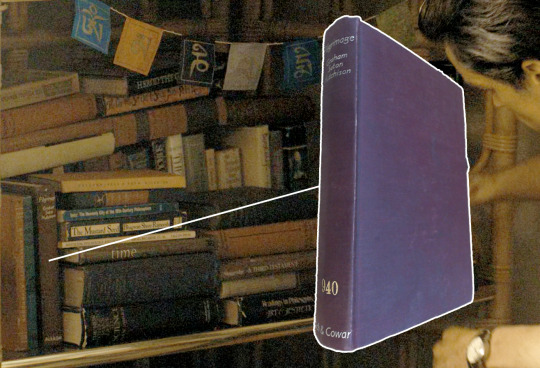
Pilgrimage by Graham Seton Hutchison (1936)
This book provides a view of the battlefields of WW I through the eyes of the average fighting man.
One curious thing about this book is that it's author, a British First World War army officer and military theorist, went on to become a fascist activist later in his life. Straight from Wikipedia:
"Seton Hutchison became a celebrated figure in military circles for his tactical innovations during the First World War but would later become associated with a series of fringe fascist movements which failed to capture much support even by the standards of the far right in Britain in the interbellum period." He made a contribution to First World War fiction with his espionage novel, The W Plan."
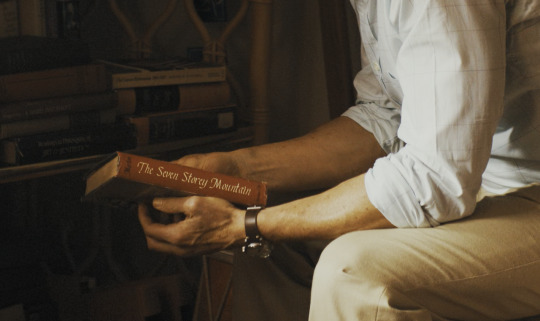
The Seven Storey Mountain by Thomas Merton (1948)
The Seven Storey Mountain tells of the growing restlessness of a brilliant and passionate young man, who at the age of twenty-six, takes vows in one of the most demanding Catholic orders—the Trappist monks. At the Abbey of Gethsemani, "the four walls of my new freedom," Thomas Merton struggles to withdraw from the world, but only after he has fully immersed himself in it. At the abbey, he wrote this extraordinary testament, a unique spiritual autobiography that has been recognized as one of the most influential religious works of our time. Translated into more than twenty languages, it has touched millions of lives.
This book requires no introduction. It's the one he keeps the Fire Island's postcard in and the one we see him re-reading in episode 8 after Hawk brings it to the hospital with him at the end of episode 7.
Just a little detail I noticed:
Apparently he liked the book so much he visited Gethsemani, which was the home of its author all the way up till 1968.

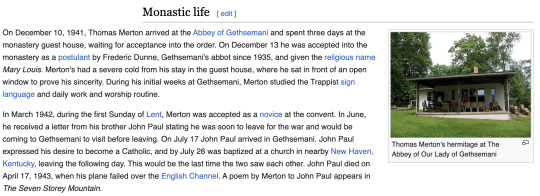
For all we know, he might have even met its author!

Sexual Behavior in the Human Male by Alfred Charles Kinsey, Wardell B. Pomeroy (1948)
When published in 1948 this volume encountered a storm of condemnation and acclaim. It is, however, a milestone on the path toward a scientific approach to the understanding of human sexual behavior. Dr. Alfred C. Kinsey and his fellow researchers sought to accumulate an objective body of facts regarding sex. They employed first hand interviews to gather this data. This volume is based upon histories of approximately 5,300 males which were collected during a fifteen year period. This text describes the methodology, sampling, coding, interviewing, statistical analyses, and then examines factors and sources of sexual outlet.
Yes, Charles Kinsey is indeed behind the Kinsey scale that has done so much for the LGBTQ+ community.

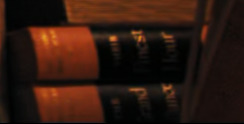
Their Finest Hour (1949), The Grand Alliance (1950), and Closing the Ring (1951) by Winston Churchill
Winston Churchill's six-volume history of the cataclysm that swept the world remains the definitive history of the Second World War. Lucid, dramatic, remarkable both for its breadth and sweep and for its sense of personal involvement, it is universally acknowledged as a magnificent reconstruction and is an enduring, compelling work that led to his being awarded the Nobel Prize for literature in 1953.
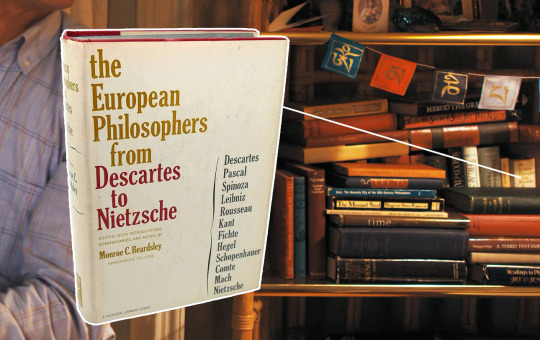
The European Philosophers from Descartes to Nietzsche by Monroe C. Beardsley (1960)
In so far as we reflect upon ourselves and our world, and what we are doing in it, says the editor of this anthology, we are all philosophers. And therefore we are very much concerned with what the twelve men represented in this book--the major philosophers on the Continent of Europe--have to say to us, to help us build our own philosophy, to think things out in our own way. For the issues that we face today are partly determined by the work of thinkers of earlier generations, and no other time is more important to the development of Western thought than is the 250-year period covered by this anthology. Monroe. C. Beardsley, Professor of Philosophy at Swarthmore College, has chosen major works, or large selections from them, by each man, with supplementary passages to amplify or clarify important points. These include: Descartes - Discourse on Method (Descartes), Thoughts (Pascal), The Nature of Evil (Spinoza), The Relation Between Soul and Body (Leibniz), The Social Construct (Rousseau), Critique of Pure Reason (Kant), The Vocation of Man (Fichte), Introducciton to the Philosophy of History (Hegel), The World as Will and Idea (Schopenhauer), A General View of Positivism (Comte), The Analysis of Sensations and the Relation of the Physical to the Psychical (Mach), Beyond Good and Evil (Nietzsche).
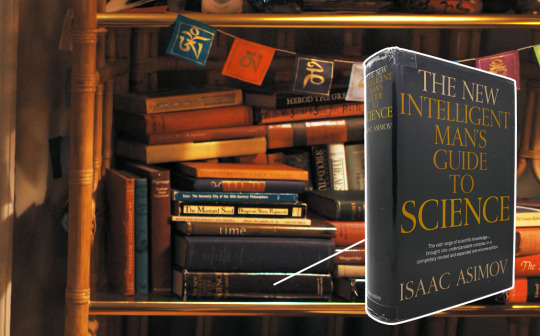
The New Intelligent Man's Guide to Science by Isaac Asimov (1965)
Asimov tells the stories behind the science: the men and women who made the important discoveries and how they did it. Ranging from Galilei, Achimedes, Newton and Einstein, he takes the most complex concepts and explains it in such a way that a first-time reader on the subject feels confident on his/her understanding. Assists today's readers in keeping abreast of all recent discoveries and advances in physics, the biological sciences, astronomy, computer technology, artificial intelligence, robotics, and other sciences.
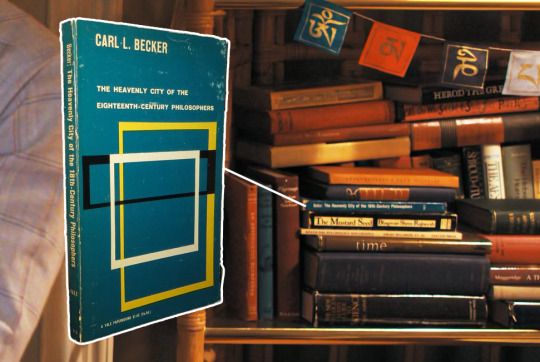
The Heavenly City of the 18th Philosophers by Carl L. Becker (1932) (1962 reprint)
Here a distinguished American historian challenges the belief that the eighteenth century was essentially modern in its temper. In crystalline prose Carl Becker demonstrates that the period commonly described as the Age of Reason was, in fact, very far from that; that Voltaire, Hume, Diderot, and Locke were living in a medieval world, and that these philosophers “demolished the Heavenly City of St. Augustine only to rebuild it with more up-to-date materials.” In a new foreword, Johnson Kent Wright looks at the book’s continuing relevance within the context of current discussion about the Enlightenment.
I find the particular choice of adding this book very curious and on brand, since it explores the idea that philosophers of the Enlightenment very much resembled religious dogma/faith in their structure and purpose. Just... A+ of the props department to not just add any kind of book on philosophy anthology.

Herod The Great by Michael Grant (1971)
The Herod of popular tradition is the tyrannical King of Judaea who ordered the Massacre of the Innocents and died a terrible death in 4 BC as the judgment of God. But this biography paints a much more complex picture of this contemporary of Mark Antony, Cleopatra, and the Emperor Augustus. Herod devoted his life to the task of keeping the Jews prosperous and racially intact. To judge by the two disastrous Jewish rebellions that occurred within a hundred and fifty years of his death -- those the Jews called the First and Second Roman Wars -- he was not, in the long run, completely successful. For forty years Herod walked the most precarious of political tightropes. For he had to be enough of a Jew to retain control of his Jewish subjects, and enough of a pro-Roman to preserve the confidence of Rome, within whose territory his kingdom fell. For more than a quarter of a century he was one of the chief bulwarks of Augustus' empire in the east. He made Judaea a large and prosperous country. He founded cities and built public works on a scale never seen before: of these, recently excavated Masada is a spectacular example. And he did all this in spite of a continuous undercurrent of protest and underground resistance. The numerous illustrations presents portraits and coins, buildings and articles of everyday use, landscapes and fortresses, and subsequent generations' interpretations of the more famous events, actual and mythical, of Herod's career.
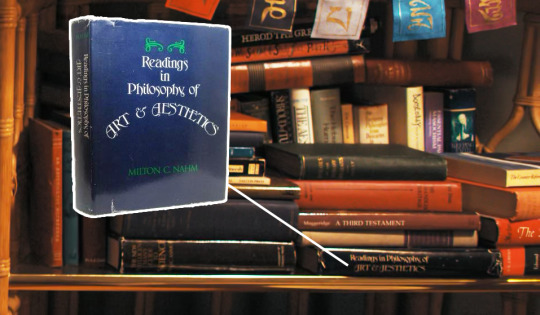
Readings in the Philosophy of Art and Aesthetics compiled by Milton Charles Nahm (1975)
A college level comprehensive anthology of essays written on the arts and the field of aesthetic philosophy.

The Mustard Seed: Discourses on the Sayings of Jesus Taken from the Gospel According to Thomas by Bhagwan Shree Rajneesh (1975)
This timely book explores the wisdom of the Gnostic Jesus, who challenges our preconceptions about the world and ourselves. Based on the Gospel of Thomas, the book recounts the missing years in Jesus’ life and his time in Egypt and India, learning from Egyptian secret societies, then Buddhist schools, then Hindu Vedanta. Each of Jesus' original sayings is the "seed" for a chapter of the book; each examines one aspect of life — birth, death, love, fear, anger, and more — counterpointed by Osho’s penetrating comments and responses to questions from his audience.
(You don't know how fulfilling it was to find some of these books and just sit there like "oh my god, yessss, he'd SO read that".)
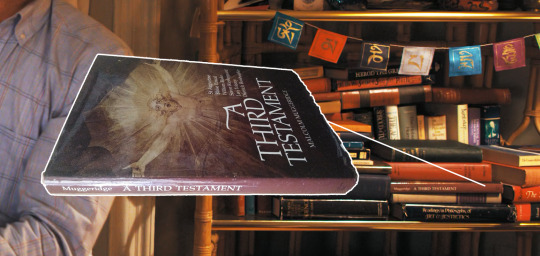
A Third Testament by Malcolm Muggeridge (1976)
A modern pilgrim explores the spiritual wanderings of Augustine, Pascal, Blake, Kierkegaard, Dostoevsky, Tolstoy, and Bonhoeffer. A Third Testament brings to life seven men whose names are familiar enough, but whose iconoclastic spiritual wanderings make for unforgettable reading. Muggeridge's concise biographies are an accessible and manageable introduction to these spiritual giants who carried on the testament to the reality of God begun in the Old and New Testaments. - St. Augustine, a headstrong young hedonist and speechwriter who turned his back on money and prestige in order to serve Christ - Blaise Pascal, a brilliant mathematician who pursued scientific knowledge but warned people against thinking they could live without God - William Blake, a magnificent artist-poet who pled passionately for the life of the spirit and warned of the blight that materialism would usher in - Soren Kierkegaard, a renegade philosopher who spent most of his life at odds with the church, and insisted that every person must find his own way to God - Fyodor Dostoevsky, a debt-ridden writer and sometime prisoner who found, in the midst of squalor and political turmoil, the still small voice of God - Leo Tolstoy, a grand old novelist who swung between idealism and depression, loneliness and fame and a duel awareness of his sinfulness and God s grace - Dietrich Bonhoeffer, a pastor whose writings and agonized involvement in a plot to kill Hitler cost him his life, but continue to inspire millions
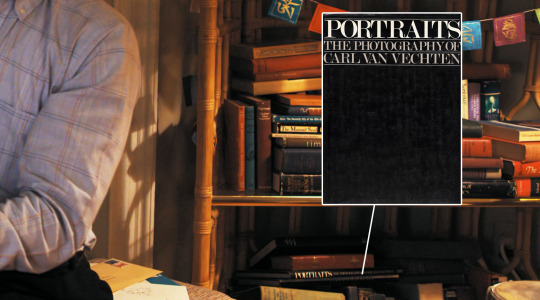
Portraits: The photography of Carl Van Vechten (1978)
Can't find a file but you can borrow it from archive.com in the link provided.
During his career as a photographer, Carl Van Vechten’s subjects, many of whom were his friends and social acquaintances, included dancers, actors, writers, artists, activists, singers, costumiers, photographers, social critics, educators, journalists, and aesthetes. [...] As a promoter of literary talent and a critic of dance, theater, and opera, Carl Van Vechten was as interested in the cultural margin as he was in the day’s most acclaimed and successful people. His diverse subjects give a sense of both Carl Van Vechten’s interests and his considerable role in defining the cultural landscape of the twentieth century; among his many sitters one finds the leading lights of the Harlem Renaissance, the premier actors and writers of the American stage, the world’s greatest opera stars and ballerinas, the most important and influential writers of the day, among many others.
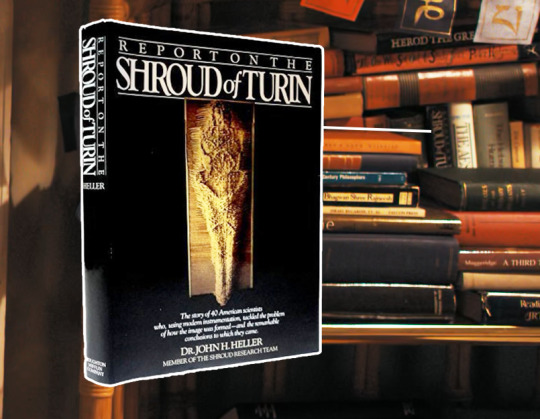
Report of the Shroud of Turin by John H Heller (1983)
Heller, while a man of science, was nevertheless a devout man (Southern Baptist). He viewed his task concerning The Shroud with great scepticism; there have been far too many hoaxes in the world of religion. The book describes in great detail the events leading up to the team's conviction that the Shroud was genuine; last - not least - being Heller and Adler's verification of "heme" (blood) and the inexplicable "burned image" of the crucified man. Although carbon dating indicates that the image is not 2000 years old and that the cloth is from the Middle Ages, there is not enough evidence to disprove Heller's assertion that the Shroud is indeed genuine.
Context for those who may not know (though I doubt it's necessary): The shroud of Turin "is a length of linen cloth that bears a faint image of the front and back of a man. It has been venerated for centuries, especially by members of the Catholic Church, as the actual burial shroud used to wrap the body of Jesus of Nazareth after his crucifixion, and upon which Jesus's bodily image is miraculously imprinted."
It is a very controversial subject matter and I definitely don't know that from going to an Opus Dei school since the day I was born till the day I graduated high school.

Mysticism, Psychology and Oedipus by Israel Regardie (1985)
I've tried my hardest but despite many Israel Regardie books being on the world wide web, I can't find a copy of this specific one.
Mysticism, Psychology and Oedipus, from the Small Gems series is one of these mysterious alchemys which Regardie and Spiegelman crafted for the serious student of mysticism. Mysticism, Psychology and Oedipus by Dr. Israel Regardie and his friend, world renowned Jungian Psychologist, J. Marvin Spiegelman, Ph.D. was created to reach the serious student at the intersecting paths of magic, mysticism and psychology. While each area of study overlaps they also maintain their own individual paths of truth. One of Regardie’s greatest gifts was his rare ability to combine these difficult and diverse subjects and make them understandable.
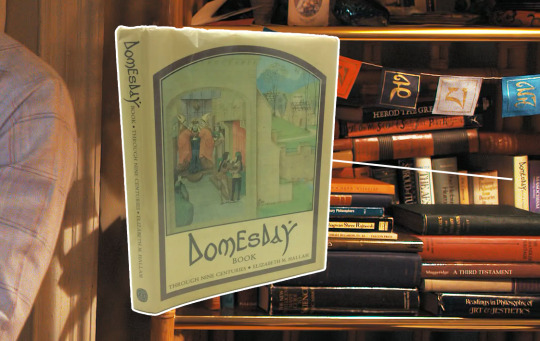
Domesday Book Through Nine Centuries by Elizabeth M. Hallam (1986)
In 1086 a great survey of landholding in England was carried out on the orders of William the Conqueror, and its results were recorded in the two volumes, which, within less than a century, were to acquire the name of Domesday, or the Book of Judgment 'because its decisions, like those of the last Judgment, are unalterable'. This detailed survey of the kingdom, unprecedented at that time in its scope, gives us an extraordinarily vivid impression of the life of the eleventh century.
The following two are a fuck up on the props department part because they were published after 1987 but we'll forgive them because they were not expecting for me to do all this to figure out the titles of these books, I'm sure:
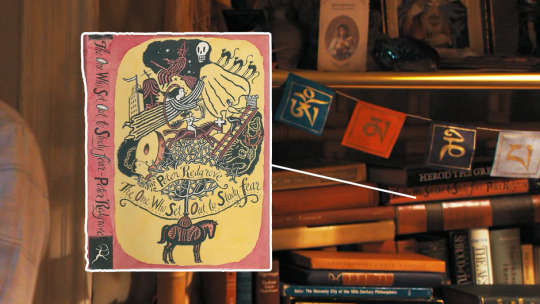
The One Who Set Out to Study Fear by Peter Redgrove (1989)
This book barely exists physically, rest assured it does not exist online... LOL.
The author of The Wise Wound presents here a re-telling of Grimm's famous fairy tales, written in a manner and spirit more suited to the present day. Each story is rooted in the original, but cast in an energetic style that is both disrespectful and humorous.
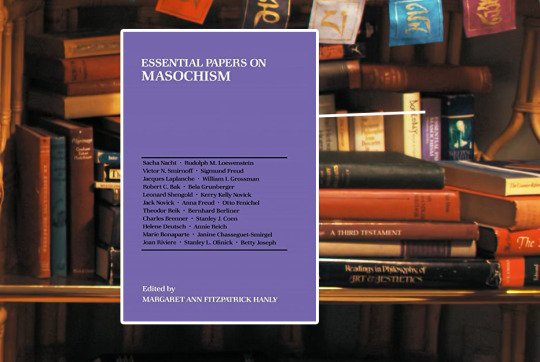
Essential Papers on Masochism by Margaret Ann Fitzpatrick Hanly (1995)
The contested psychoanalytic concept of masochism has served to open up pathways into less-explored regions of the human mind and behavior. Here, rituals of pain and sexual abusiveness prevail, and sometimes gruesome details of unconscious fantasies are constructed out of psychological pain, desperate need, and sexually excited, self- destructive violence. In this significant addition to the "Essential Papers in Psychoanalysis" series, Margaret Ann Fitzpatrick Hanly presents an anthology of the most outstanding writings in the psychoanalytic study of masochism. In bringing these essays together, Dr. Fitzpatrick Hanly expertly combines classic and contemporary theories by the most respected scholars in the field to create a varied and integrated volume. This collection features papers by S. Nacht, R. Loewenstein, Victor Smirnoff, Sigmund Freud, Jacques Laplanche, Robert Bak, Leonard Shengold, K. Novick, J. Novick, S. Coen, Margaret Brenman, Esther Menaker, S. Lorand, M. Balint, Bernhard Berliner, Charles Brenner, Helene Deutsch, Annie Reich, Marie Bonaparte, Jessica Benjamin, S.L. Olinick, Arnold Modell, Betty Joseph, and Janine Chasseguet-Smirgel.
Let's not forget another book we know has been present in his shelves at some point:

Look Homeward, Angel by Thomas Wolfe (1929)
It is Wolfe's first novel, and is considered a highly autobiographical American coming-of-age story. The character of Eugene Gant is generally believed to be a depiction of Wolfe himself. The novel briefly recounts Eugene's father's early life, but primarily covers the span of time from Eugene's birth in 1900 to his definitive departure from home at the age of 19. The setting is a fictionalization of his home town of Asheville, North Carolina, called Altamont in the novel.
And Ron Nyswaner mentioned in a podcast (might be this one? I'm not sure) that he scrapped from the script a line where Tim recommends this poem at some point:
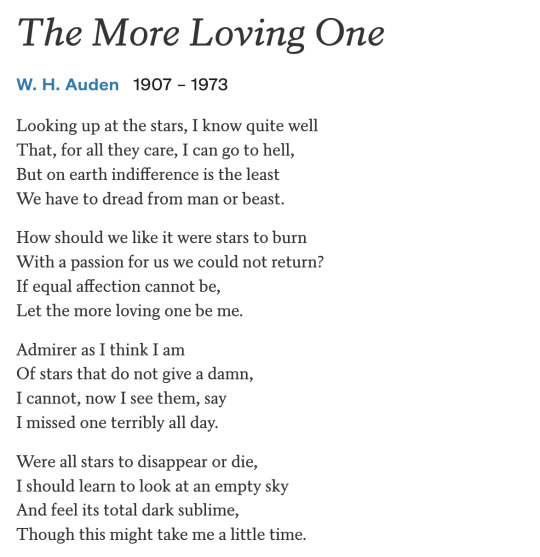
He specially emphasized the line "If equal affection cannot be, Let the more loving one be me".
And lastly, if anyone wanted to know:
His copy of the bible is the Revised Standard Version by Thomas Nelson from either 1952 or 1953.
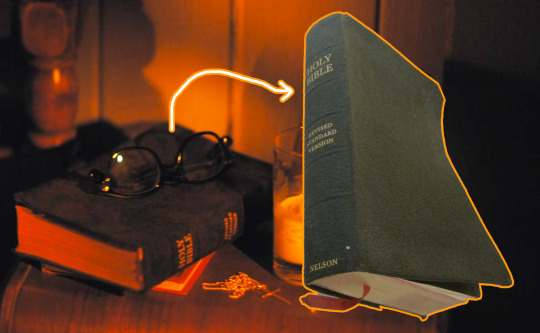
Because why the hell not figure out what specific translation of the holy bible a fictional character was basing his beliefs on — as if the set designers cared nearly as much as I do.
#fellow travelers#fellow travelers meta#tim laughlin#fellowtravelersedit#i know it doesnt precisely fit the tag but hey.. theres a gif right there#this is such a jobless thread... but i AM jobless
143 notes
·
View notes
Text
sorry something i dont get is why is every other piece of Travis fanart holding a rosary when the Devourers of God is clearly based on American evangelicalism, not Catholicism. but ignoring the cult stuff for a moment, if Trav would grow up in any denomination of Christianity, it'd 100% be conservative Evangelical Christianity; or at least, heavily inspired by said branch.
his "sinful" THOUGHTS abt Sal makes more sense from a protestant household when most branches dont believe in the absolution of confession and are more focused on being perfect at all times, because there is no true absolution with a priest like there is in Catholicism.
Catholics don't believe having sinful (using that word very loosely here since we're talking about gay people..and im also queer) thoughts are as bad as actually acting on them; Evangelicalism treats them with about the same sense of severity.
also, Travis' FATHER is a PREACHER; something that cannot happen in Catholicism, since priests must remain celibate. the commentary on conservative Christianity as a whole is still there, but it's def more focused on protestantism.
(Fundie Friday's has a great video about them, go check it out!!)
like even on the wiki for Kenneth, it's stated that he might've been based on Fred Phelps, aka the founder of the Westboro Baptist Church, which is basically a cult. like fr.
in any case, if you project onto him bc of your own trauma involving Catholicism, that's totally fine, and i'm not one to judge! i just find if very funny that people will ignore the clear subtext in favor of a more preferable and normalized aspect of religious trauma just because of their own feelings on Catholicism specifically, even if someone didn't even grow up in the Church.
note that i am a practicing Catholic, so this might come off as more biased, but the whole thing is so facinating to me. i get where the misconceptions come from since Catholicism has more cult-y aesthetics similar to the DOG, but they are nowhere close to the same please look into protestantism im begging!!
40 notes
·
View notes
Text
I decided to make this its own post for two reasons: one, I didn't want to derail a post that is about Judaism with a discussion of a different faith and two, it was really only one of several posts I've seen recently that stuck out to me as being "man, this is way off-base."
This is not so much about "people are saying mean things about this religion and it hurts my feelings!" but it is definitely about "people are making statements that represent a wildly skewed and inaccurate picture of the reality, and I can't tell whether they're being hyperbolic on purpose or think they're genuinely telling the truth." This is not a question of whether any given church is good or bad; this is a question of whether there is or can be a distinct entity that serves as a single unified church or faith in American Christian tradition (spoiler: No.)
Here's the basic message: Any discussion of "the Christian god" or "the Christian faith" or "American Christianity" needs to be taken with a big honking asterisk that there is no single portrayal of God, or Christianity, or spirituality and faith that conveys accurate information about the entire breadth of American Christianity.
There is no single American Christian Church. None. The single biggest branch of American Christianity, Southern Evangelical Baptist, makes up at its broadest 30% of all American Christians (12% of the overall population.) The rest are split between Catholic, Methodist, Episcopalian, Presbyterian, Lutheran, Pentecostal, Adventist, Congregationalist, and a dozen other even tinier branches, before you even get into the more far-out variants that people have ongoing arguments as to whether they even really count as "Christian." (LDS, Unitarians, and possibly Mennonites fall into this category.) Most of the major branches share a lot of common ground, but there's an enormous amount of variation -- they disagree widely on concepts such as the existence or nonexistence of Hell; the mechanics of conversion or salvation; the requirements of baptism or confirmation; whether prostylezation is required, encouraged or even permitted; what kind of sexualities are or are not accepted; God as an active or non-active role in the world; how 'sin' works or if it's even a thing; the existence or not of saints; the divinity or not of Christ; or even the idea of an anthropomorphic God at all. Some are progressive, some are fundamentalist, some are fundamentalist in ways that are completely at odds with the popular perception of what those fundaments are. I personally know one Methodist pastor who also believes and teaches about God as a "oneness of the universe" and have met others who conceive of God as "that which spans the space between the limits of our understanding and the limits of our universe." You cannot categorically state that all American Christians share a common notion on any of these topics.
Other statements I've seen recently that just made me go "what? no?"
That the USA was founded by religious extremists and That's Why America is Like That. Only one or two of the original settlements were founded for this purpose. Some were founded with an explicit purpose of total freedom of (or from) religion; others were entrepreneurial ventures with nothing to say on the topic of religion at all. When the guiding documents of the American state were put together the clause of freedom of religion was included front and center precisely because they didn't want religious extremists to be steering the ship.
That the majority of USAmericans are in cults and don't even realize they're in cults. This requires both an extremely broad definition of “cult” (to encompass pretty much any branch of Christianity, not only the more extremely evangelical ones) and severely over-estimates how many people in the US are practicing Christians (less than half.)
That the "Christian God" is intended to function as a "Great Uniter" into which other faiths can be folded; This is not a Protestant thing. Most Protestant faiths are not syncretic to the degree Catholicism is (or at all,) since there wasn't a motivating political entity backing their creeds to make them so. Again: Not all branches of American Protestantism require, encourage, or even permit prostylezation.
On that note: Not all Christians are Catholic. This isn't news, right? People know this, right? This is one of those things that I always assumed was very common knowledge, and was very surprised to run into people who were not aware of this (who either think that all Christians or Catholic, or else that Catholics are not Christian at all, depending on which side of the equation they're approaching from.) Protestant and Catholic Christianity are very very distinct entities both spiritually and politically, and in the USA, Catholic Christianity is a minority religion and is mostly (though not exclusively) practiced in minority demographic communities. Of 46 presidents so far only one has been Catholic, and a lot of the opposition to JFK's appointment was people being suspicious of his Catholicism since it was thought that his loyalty to the Church might supersede his loyalty to the US. American Christianity is mostly Protestant, not Catholic, and Protestant Christianity does not function at all the way Catholicism does. We had a whole Reformation about this. Any take that refers to "The Church" in America as a single united entity that dictates theology to its outreaching branches is... off-base.
What certainly is true is that a number of individual churches in the US have organized around the aim of consolidating social and political power, have worked at advancing their members to positions of power in order to protect and promote their interests, and thus are over-represented and have outsized influence on the political sphere. The ones that do this, as well as the ones that put emphasis on proselytizing and on money-making, tend to self-select for being the most visible and infamous because their business model is expansive by nature. That's certainly the case for the SEB in the American South, or the LDS in Utah. I really get the feeling when people use these broad terms that they are thinking either of the SEB (again, not even a majority among American Protestants!) or of the Catholic church (even less so!) But not only do not all Americans agree with those beliefs, they don't even agree with each other.
1K notes
·
View notes
Text
Why do Monsters in Undertale and Deltarune use Words like 'Hell' and 'God' in their Everyday Language?
Additionally, a Theory on the Time Period During Which Monsters were Trapped Underground
OKAY SO hi Pup here with more UTDR insanity on a topic that I do not have the historical knowledge to be properly qualified to talk about, but am going to talk about anyway because it's been lingering in my head for a long time.
The monsters in Undertale and Deltarune use terms like 'hell', 'god', 'damn', etc., implying that they have enough of a concept of hell, god, damnation, etc. ingrained into their society for it to be used in casual speech. But that stuff comes from human religions. It fits easily into our understanding of language, given that those are the terms we commonly use, but monsters don't follow human religions as far as we see, and the widespread use of those terms comes from the influence that Abrahamic religions have had on our society. We don't see any established monster religions at all in Undertale, and in Deltarune there's obviously the Angel.
The Doylist reason for monsters using those terms despite the lack of human Abrahamic religions in their society is obviously just that Toby Fox is a human living in our world who is used to using those terms and likely didn't think twice about including them in his game. However, that reason is not nearly as fun as going insane over minor details in video games. Thus, this lengthy post.
In Deltarune, the religion we see in Hometown is the one that worships the Angel. We don't know how prevalent this religion is in the wider world, nor how many people in Hometown actually worship it, but it's a commonplace enough belief that the town has a church in it that seems to have been around for a decent amount of time.
While it's highly possible that the worlds of Undertale and Deltarune are entirely different from ours, I am going to be operating on the assumption that they both take place in worlds that are pretty much the same as ours, with only minor differences aside from the existence of monsters, which I'd say counts as a pretty major difference.
Now, as the Angel religion doesn't have a concept of sin, we can assume that there's no concept of punishment for sin either, and therefore no hell. However, through Alvin's wording of "our religion", combined with Asriel confessing to his 'sins' despite the lack of sin or confession in said religion, we can infer that there are indeed other religions in the world of Deltarune, and at least one relatively prevalent other religion contains the concepts of sin and confession. (Susie and Lancer both actually directly mention Christmas at one point, which means that Christianity exists in Deltarune, alongside the religions and practices that are the origins of many Christmas traditions.)
Assuming that monsters were never trapped underground in Deltarune, they were likely living alongside humans that whole time, and it's therefore quite likely that they would have picked up popular phrases that reference human religions. In fact, it's likely that monsters themselves followed the beliefs of Christianity, Catholicism, or the like at some point, given those religions' prevalence. (It's also possible that this influence is part of why monsters in Deltarune don't seem to use magic like their counterparts in Undertale do, given Christianity's whole thing about magic and stuff.) Monsters, like humans, probably don't all follow the same religion (Monster Teen, for example, wears a necklace with a cross pendant. While this choice could simply be aesthetic, it's equally likely that they're Christian, Catholic, etc.). And, given the whole Angel thing, it's possible that Hometown's predominant religion is an offshoot of a pre-existing Abrahamic religion.
In Deltarune, it is not at all out of the question and in fact makes complete sense for monsters to be referencing things like god or hell.
In Undertale, monsters have been stuck underground for an unknown but very long period of time, to the point where most of the adult population has never even seen the surface. (I am NOT going to be theorising about how monsters age, because I have already been down that rabbit hole multiple times and have nothing to show for it except confusion.)
My current theory is that they were trapped sometime during the 11th, 12th, or 13th centuries, most likely the 12th. If we look at the architecture of the Ruins, the first place that was settled by monsters:

It's quite similar to Romanesque architecture, which lasted from the 10th century to the 13th and was predominant in the 11th and 12th centuries.
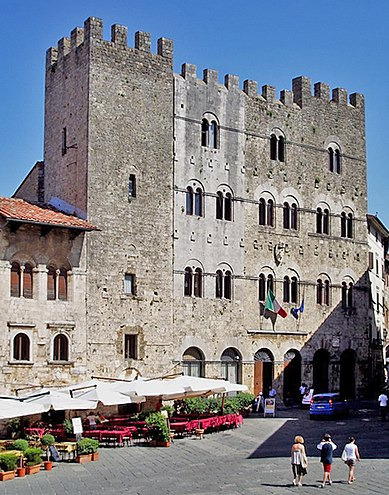
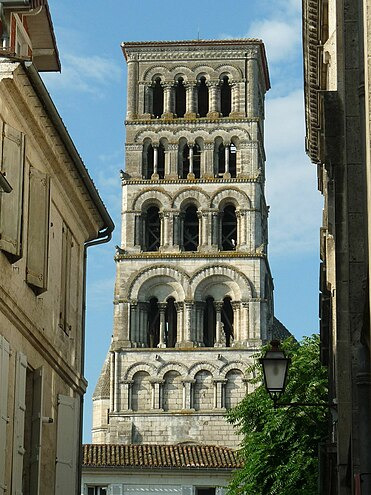
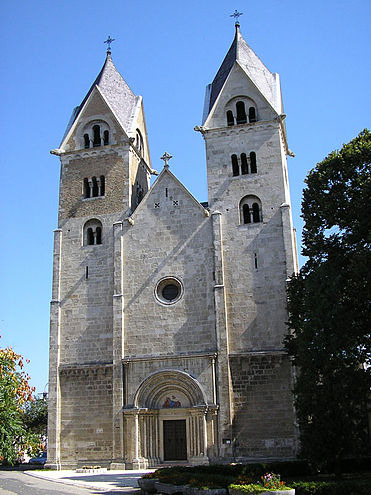
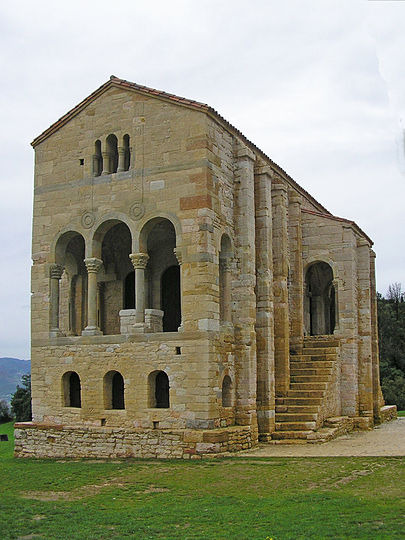
This style is mostly reflected in New Home
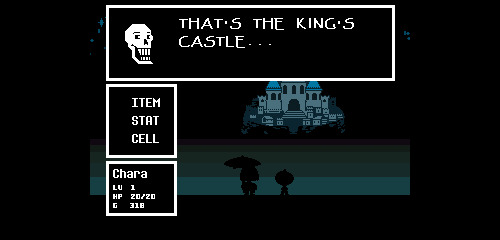
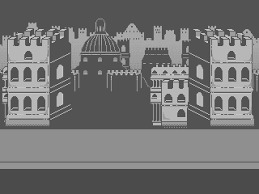
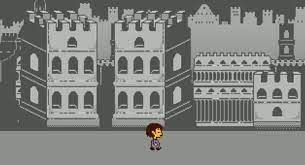
Except for in the Last Corridor
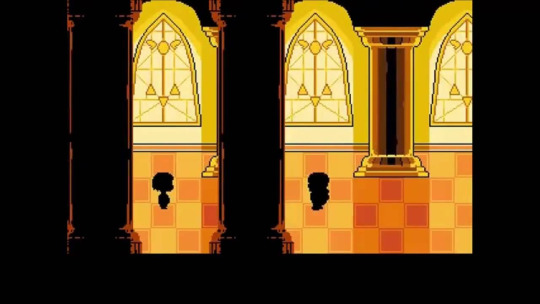
Where the pointed arches are reminiscent of Gothic architecture, which was active from the late 12th to 16th centuries.
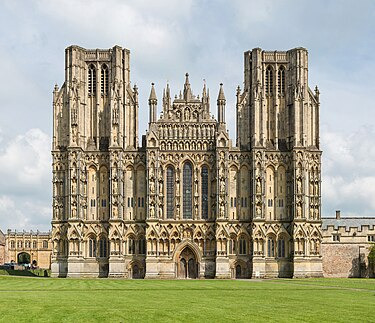
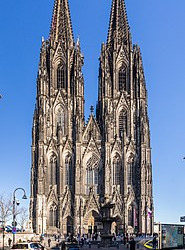
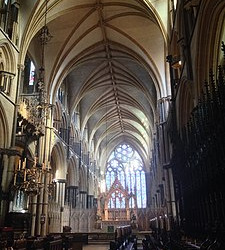
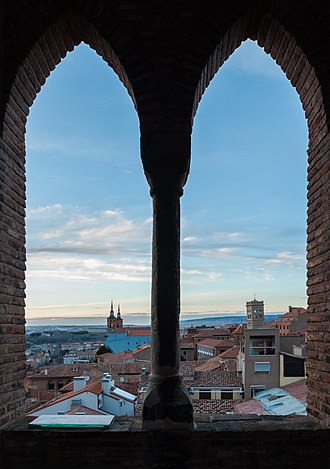
While we know that monsters receive human garbage via the dump in Waterfall, I'm going to assume that nobody would be throwing out schematics for their Gothic windows. Therefore, considering the timeframes of both these architectural movements, monsters were likely trapped underground in either the late 12th or the 13th century, with my money being on the late 12th given the prevalence of Romanesque architecture as opposed to the much rarer cases of Gothic architecture that we see (acknowledging, of course, that we do not see all of the Underground, and that I am only working off the knowledge I have here).
More potential proof for this time periods comes from the intro, where we see the silhouettes of several humans.

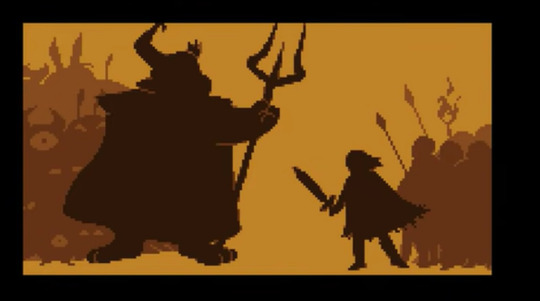
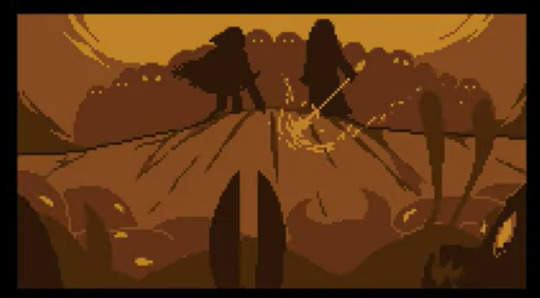
There are no guns or other firearms shown, meaning that the War of Humans and Monsters occurred in a time when spears and swords were used in wars instead of guns. While I couldn't find a spearhead that matched the one depicted, there is a human shown holding a sword, which we get to see at two angles.
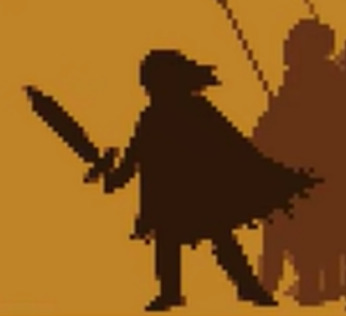
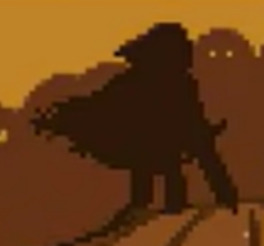
I originally assumed from the first image that it was a leaf-shaped blade, but looking at both the first and second images, I theorise that this is depicting a knightly sword, also known as an arming sword, used as a one-handed sword, usually alongside a shield, in the high middle ages (1000 - 1300 CE).
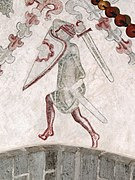
While still used in the late middle ages (1300 - 1500 CE), longswords were more common as a primary weapon, and arming swords were often employed as a sidearm in addition to a primary weapon. While the sword depicted in the image is too short to be a longsword, it seems to match the length of an arming sword fairly well, and we can see that its wielder is using it as a one-handed weapon, rather than the longsword's intended two-handed grip.
Now, I'd say it's likely that most or all monsters only lived around one area, since it would have been a bit difficult for the humans to trap every single living monster underground if they'd been spread all over the world. If monsters only existed around one area in the high middle ages, they could have been fought against in the war and trapped underground much more plausibly, and they could have been easily dismissed as myth in later millennia.
The prevalent religion during the Middle Ages was Christianity, and we know that there were some pretty strong opinions about things like magic and other belief systems. It's stated in the game that the war started because humans were scared of the monsters' power to absorb human SOULs, and while that was probably part of it, it's not hard to see how the humans of that time could have turned on the monsters out of fear of their magic, or even just not being human, in addition to the stated provocation of monsters being able to absorb human SOULs. We also have to remember that we only get information about what happened from the monsters' perspectives, written on stone plaques, thousands of years after the fact. We don't have the full story here, and I suspect that the conflict was already brewing, and that the monsters' recorded reason for the war was simply the thing that tipped it over the edge.
Anyway, if monsters were living amongst or near humans during the Middle Ages, they were probably following or at least had a lot of exposure to the prevalent religion and its effects on commonly-used language. (It's also possible that the symbol of the Delta Rune and the prophecy about the Angel who has seen the surface is a remnant of the Angel belief system we see in Deltarune.) Their use of language could have evolved in a similar way to ours over the centuries, words like 'hell' and 'god' becoming more detached from their religious connotations when used in everyday expressions, and, with the added influence of human media that began falling into the garbage dump in Waterfall, their use of those words, as well as language in general, became remarkably similar to our own, despite them having been trapped underground for all that time.
And... yeah. That's it. That's the theory. If someone who actually knows about this sort of stuff happens to come across this post, please feel free to add your expertise. I'm going off internet research here, I'm not qualified to be talking about this.
#babble#rant#ramble#rose's rambles#undertale#deltarune#undertale theory#deltarune theory#utdr#i am seriously so confused about how monsters age it hurts my brain#because we have asgore and toriel#who are boss monsters and only age when they have a child#and okay that makes sense that they've been around for so long#BUT THEN we have gerson. who literally fought in the war of humans and monsters#and has CLEARLY aged but isn't dead yet despite the time that has passed#and i SUPPOSE he could also be a boss monster and just be aging because he had alvin#but -#...wait that would actually be a good explanation for it#...............#...never mind then#ADDITIONAL THING:#universities became a thing in the 1000s. in the winter alarm clock dialogue asgore says he went to hotland university.#(which also calls into question whether or not he was king at the time of the war or not)#(but that's hard to prove either way so i'm not getting into it)#at one point while researching for this i paused and realised i'd spend like half an hour just. looking at swords.#which was enjoyable but not what i'd intended to be doing
17 notes
·
View notes
Text
Hermes/Mercury In Poetry: A Compilation Of Poems By Sappho, Carl Dennis, And Shirley Burger With Mediocre Analysis
Hermes and Mercury are a god who has remained in the public consciousness despite the fact that worship of them has dwindled to nearly nothing (shoutout to my fellow Ancient Greek polytheists, though). Due to still being in the public consciousness despite everything, it’s not that surprising to see Hermes and Mercury still popping up in everything from video games to battleships, and don’t get me started on Hermes Trismegistus. (No, really, please don’t, I don’t know enough about Hermeticism to get into that.)
This is not any form of professional comparative essay. Or even a casual comparative essay. This is just me going feral over poetry and Hermes/Mercury. Let’s get this shit started.
In Sappho: A New Translation (translated by Mary Barnard), Hermes appears in two parts: 14 and 97. These depict Hermes in two vastly different roles: cupbearer and psychopomp.
Fragment 14 goes as thus:
PEACE REIGNED IN HEAVEN Ambrosia stood already mixed in the wine bowl It was Hermes who took up the wine jug and poured wine for the gods
Fragment 14 depicts Hermes in the role of cupbearer for the gods, a duty more often attributed to Hebe (the daughter of Zeus and Hera, the goddess of youth) or Ganymede (a Trojan prince, the constellation Aquarius, god of homosexual love, playmate of Eros and Hymenaios). Theoi.com lists him as being a cupbearer among other things due to his ministry to Zeus, but I’m gonna be honest, I had a hard time figuring out how to read their citations and couldn’t find any other instance other than the general page about this particular thing. The most likely answer here, though, is that I just suck at reading.
Meanwhile, Fragment 97 depicts a more well-known side of Hermes:
I HAVE OFTEN ASKED YOU NOT TO COME NOW Hermes, Lord, you who lead the ghosts home: But this time I am not happy; I want to die, to see the moist lotus open along Acheron
Our girl Sappho was fucking going through it, man. This poem calls to Hermes as a psychopomp, a duty attributed to him in Homer’s Odyssey (an epic from C8th B.C.), the Homeric Hymn 4 to Hermes (an epic from C7th to C4th B.C.), Aeschylus’s Libation Bearers (a tragedy from C5th B.C.), and more and more as we get closer to the current period in history. According to the Homeric Hymn 4, he got this job after being sent to retrieve Persephone and handling that whole scenario, so Zeus just appointed him to keep that psychopomp job. The downsides of pulling things off well, I suppose.
So, that was how Sappho perceived Hermes through poetry. How about something more...modern? In 2001, Carl Dennis published “Practical Gods”, which won the 2000 Ruth Lily Poetry Prize and the 2002 Pulitzer Prize. Greek, Catholic, and Christian figures appear through these poems as Carl Dennis draws on mythological and religious imagery for his works. Hermes appears in “A Priest of Hermes” in his psychopomp duties, and the idea of Death and how one dies appears in other poems in this book, like “Eternal Life” and “Progressive Health”. (Not every poem in this work is focused on Death, but those ones were the most striking to me when I first read them.)
A Priest of Hermes The way up, from here to there, may be closed, But the way down, from there to here, still open Wide enough for a slender god like Hermes To slip from the clouds if you give your evenings To learning about the plants under his influence, The winged and wingless creatures, the rocks and metals, And practice his sacred flute or dulcimer. No prayers. Just the effort to make his stay So full of the comforts of home he won’t forget it, To build him a shrine he finds congenial, Something as simple as roofed pillars Without the darkness of an interior. If you’re lucky, he’ll want to sit on the steps Under the stars for as long as you live And sniff the fragrance of wine and barley As it blows from the altar on a salty sea breeze. He’ll want, when you die, to offer his services As a guide on the shadowy path to the underworld. Not till you reach the watery crossing Will he leave your side, and even then He’ll shout instructions as you slip from your shoes And wade alone into that dark river.
To me, this poem feels warm and comforting, in a way that Death is only sometimes described. Death as a gentle force is becoming more popular to depict rather than violent Death, as Death is slowly being seen as something that comforts you after a long period of hardship (fighting terminal illness, being in danger, a heart attack, et cetera) or to help you step forward if you die in a more peaceful manner (such as dying in one’s sleep). This poem being so calming makes sense: a psychopomp’s duty is to guide you to the afterlife, and it’s hard to guide someone who’s flipping the fuck out.
Let’s fast forward five years, to 2006. Noble House Publishing put out “Songs of Honour”, an anthology of poems that span all kinds of authors and subjects. (It’s also completely unclear whether or not the writers knew that their works were being used in this, and it doesn’t have an ISBN...) But the poem of note here is Shirley Burger’s “Mercury, Oh Caduceus”, found on page sixty-nine (nice). Let’s see if you can figure out why it was so interesting to me. The poem goes as follows:
Mercury, Oh Caduceus Mercury, such a toxic rhyme... A goddess, once upon a time... Twisted with your mammon ways... Oh my Father counts the days... When your Caduceus will be revealed... For all your bronze and all your “steal”... You’ve preyed upon the children dear... And as you speak all I can hear... Is poverty upon us all... You’ve tripped us up and made us fall... Soon your serpent ways will see... Nothing about you makes us free... Your lies are beneath all your hidden ways... Oh how my Father counts the days... Until your statue crumbles hard... And frees the people once again... From what you’ve told us is our friend... Your lies stroll forth unto the day... When thoughts of you will go away... Forever.
Okay, yes, yes, this poem treats Mercury as being synonymous with the serpent that convinced Eve to bite the fruit of knowledge and reads like a Christian freaking out about heresy and misleading the children, yes, sure, whatever. It’s like the polar opposite of Carl Dennis’s approach to Hermes.
But most interesting to me is the fact that the author refers to Mercury as a goddess. This is fascinating to me because in Western astrology, despite Mercury being a “masculine” god, Mercury the planet is considered to be perfectly neutral in terms of masculinity and femininity. I have no idea how Shirley Burger managed to make the jump from “Mercury is a Roman god” to “this is a goddess”, considering everything, but it’s fascinating to me.
There is no closing statement for this post! It’s not even a formal essay! I’ve said “fuck” four times, after all. But this is the end of the Tumblr post. Enjoy the poetry.
Sources & References
(Yes, I found an online MLA 9th edition citing website tool just to make these look fancy. Fuck you.)
Wikipedia contributors. “Hermes.” Wikipedia, 10 Jan. 2002, en.wikipedia.org/wiki/Hermes.
Wikipedia contributors. “Mercury (mythology).” Wikipedia, 17 Nov. 2024, en.wikipedia.org/wiki/Mercury_(mythology).
“HERMES - Greek God of Herds and Trade, Herald of the Gods.” Theoi Greek Mythology, www.theoi.com/Olympios/Hermes.html.
Sappho. Sappho: A New Translation. University of California Press, 2019.
Dennis, Carl. Practical gods. National Geographic Books, 2001.
Burger, Shirley. Songs of honour. Edited by Noble House Staff, Noble House Publishers, 2006. “Mercury, Oh Caduceus”, pg. 69
Burk, Kevin. Astrology: Understanding the Birth Chart : a Comprehensive Guide to Classical Interpretation. Llewellyn Worldwide, 2001.
20 notes
·
View notes
Text
basilica
tomura shigaraki
cw: religious trauma, religious motifs/themes/imagery, catholicism, defiling of the church, angst, hurt, slightly ooc
a/n: just a short angry religious trauma post drabble bc i'm feeling a type of way rn and it kinda sucks lol. sorry for projecting this onto u tomura i love u
try reading with the song! it adds a layer to the writing i feel honestly is kind of important
Tomura wanted to cry. Wanted to scream in anguish, beg and plead for a miracle or a sign from a God, any God. But the pews of the rotted church served little to sanctify him as he crumbled each one with an angry fist. Shaking fingertips dug into the deep grooves in the mahogany and crumbled them into forgotten prayers. Scattered pages of proverbs and psalms littered the marbled tiles, and the sun rays twinkled in through the ornate stained glass, reminding him just how small he was against the hands of God. There was no God here- only Him, and He alone could stand the tides of change with a battering ram for a heartbeat. It hurt, it hurt so badly, to be forgotten and known all at the same time. Who was he? Tenko Shimura, the sweetened cherub boy, with scraped kneecaps and bruised elbows? No, never. It was a dream, a softened hymn that only time knew the words to. Now he stood, an adult in the eyes of society- though his body never felt quite big enough to be- Tomura Shigaraki. A man, a disciple of the Feared One, a machine created to destroy. And destroy he would. Starting here.
He didn't believe in God. He didn't follow the practice of any one religion, especially not the Catholic Church. Hell, the fact that there was even a church to find out here was a one in a million shot- they weren't exactly few and far between in the cities, but the Catholic population in Japan was a small decimal compared to Shintoism or Secularism. But for this moment, he felt it was best to be in here. A lot of western media he had consumed over the years painted church and Christianity as some all-consuming Light, like this is where miracle happened. Well, the only miracle here was that Tomura even set foot inside.
Every step pressed another layer of dust into the deep red runner up to the sanctuary. The altar remained pristine as he caught his breath, his throat tight and dry. The sound of his thumping heart swelled in his ears and head, the pressure reminiscent to being underwater. Looking up, the height of the cathedral shrank him down to atoms. It felt like a mockery. Like even God was reminding him he was small.
Small. Tiny. Pitiful.
Each word of arrogance against him made his blood turn darker, thinner, rushing through his veins as he grasped at the elegant pillars, dragging himself to the ground with a gasping cry, so that he fell to his knees at the altar rails, his tired bloody eyes locking with the adorned chancel, and the poignant, giant statue of the Son, hung plainly in front as if to scream "I'm here, too".
He felt more alone at this revelation, that human faithlessness was so overlooked because of sin, that people like him weren't meant to be here not because of their trouble finding faith, but for their lack of it. That he too would be damned because he chose not to find light in God, and instead found his own way of safety through destruction and chaos and everything Sensei had taught him. His own scripture, signed in viscera, torn at the edges. It wasn't his fault no one taught him to believe, but it was damn sure his fault he didn't seek it for himself- and he felt it, now, as Mother Mary's half-lidded gaze held above his wakened frame as if he were a pestilence on this world that God created.
Was he in the wrong for keeping his head low? Should he hang it high, be grateful for the hands that supposedly formed him and molded him? This, Tomura knew, was the entire reason behind his aversion to faith. Because he needed someone to listen, and not a single ear fell for him. Not even Sensei cared enough to listen to his alleged son, his pride and joy as some called it. He felt neither prideful or joyous when face to face with him, instead it was a sinking, sorrowful feeling, that could best be described as grief. Grief for his old life, or for the new one he failed to perfect for himself, his Sensei, his friends- try as he might, he was just so small here, and could do only so much.
Church was a last-ditch effort to feel something. Anything. His time was low, and the unfortunate arms of fate were every turning and chiming, reminding him that his goal was only so far. It was seconds away, he felt as he could reach out and grasp it- but he was too well trained, he knew better than to reach out to the things he really wanted, in fear he would destroy it all in the blink of an eye. Not even Gods hands could hold him now, though, as he pretended to pray for one last chance.
His hands pressed into the cold tile and he felt the ground beneath him rumble, his body quaking and splintering in wretchedness, the power lifting him entirely. The pure white turned a murky grey as they shattered and cracked under him, the giant spires atop the roof even quivered at the desolation. And as he screamed, as his throat burned in anger, poor Mother Mary fell to the ground from her pedestal, an ironic display. The caricature of fallen angel, in the house of God, airing his grievances to no one but marble and blood wine, he stood. Destroying it all.
Not in the name of God, but the name of Tomura Shigaraki. Because there was no God that could ever come close to being this angry.
#myposts#mha#bnha#my hero academia#tomura shigaraki#tenko shimura#mha shigaraki#shigaraki angst#cw religion#cw religious themes#cw religious imagery#Spotify
33 notes
·
View notes
Text
We knew it was coming but seeing it happen in real time is just. Yeah.
Here's the full text of the executive order as well if you can stomach reading it.
A few things of note:
The order came with the pardoning of anti-abortion protestors who were convicted of breaking laws about blocking or otherwise stopping people from being able to access health care centers and the calling of those laws "anti-Christian," with zero consideration about the rights of people who are trying to get goddamn healthcare.
The order called the FBI's brief investigation of far-right traditional Catholic groups (often called "trad caths," who include white supremacist Nick Fuentes of "Your Body My Choice" fame among their number) as possible domestic terrorist threats as "anti-Christian bias" and thus signaling that any far-right extremist groups that claim to be Christian cannot and should not be considered security threats (meanwhile the FBI has been planting informants in Muslim places of worship for years).
Reversing Biden-era policies within the foster care system that sought to protect LGBTQ+ children within that system, which they called an effort to "drive Christians who do not conform to certain beliefs on sexual orientation and gender identity out of the foster-care system." I.e. "it's anti-Christian bigotry to not put queer kids in foster homes that believe queerness is a sinful abomination."
Creating a task force within the Department of Justice called "Task Force to Eradicate Anti-Christian Bias." The purposes of this task force is essentially to monitor other government agencies, including the Department of Labor, the Department of Education, Health and Human Services, and the IRS to "identify any unlawful anti-Christian policies, practices, or conduct by an agency contrary to the purpose and policy of this order."
I love watching a burgeoning fascist theocracy take form in real time.
#*Deepest Sigh*#Project 2025#Christian Nationalism#Christian Fundamentalism#American Christianity#Donald Trump#Trump Administration
11 notes
·
View notes
Text
@maaruin
Hinduism is probably a good example for how Roman-Platonist Monotheism would look like without the Jewish origin of Christianity: the theology is monotheist but to an outside observer the rituals look like they are honoring various gods, because polytheist practices have been re-interpreted in a monotheist way. Christianity is unusual not in its monotheist beliefs, but in that it required its followers to stop performing the traditional (polytheist) rituals.
I want to expand on this bc it touches something else McClellan mentions--how being the organized faith of the Empire really changed Christianity, or at least Nicene Christianity. Before it became institutionalized, there was a lot of room in early Christianity for different, contradictory Christologies (like Arianism, which was basically mainstream at one point); it's only with the Council of Nicaea that a compromise form of all these Christologies has to be hammered out (because the institutional church needs dogmatic harmony), and the boundaries of orthodox theology have to be policed--and can be, eventually with the full backing of state power. Before the most you could do was expel members of your church who disagreed with you, maybe refuse association with other churches whose theology differed too much. Once you have state backing you can use that authority to exclude heretics; and, later, once you are the official religion of the Empire, you can have heretics punished by the state.
I think this harsh ideological boundary maintenance really becomes a part of every state-backed church, but of course it's the Roman one that is by far the most powerful and most widespread; and even post-Great Schism and the fall of the western empire, the need for Catholic rulers to be in good with the Pope, and thus to enforce Christian orthodoxy within their territory, has the same boundary-maintenance effect.
McClellan contends that without this forced institutional compromise--which is what the Trinity is; "three persons with one substance" and stuff like "100% divine and 100% human" is not just "a mystery," it's functionally a nonsensical contradiction, and the reason why so many attempts to explain the Trinity fall into heresies like modalism or partialism is because the Trinity is wording-by-committee aimed at producing phraseology that most people at this one ecumenical council could tolerate, even if they didn't like it.
And by "most people" here we mean a very particular kind of educated Greco-Roman elite; a lot of early theology is shaped by what is conceptually acceptable to these guys, steeped in stuff like Neo-Platonism, and maybe doesn't have all that much to do with the peasant religion version of Christianity elsewhere (indeed, get your average theologically-untrained Christian of any era to try to explain something like the Trinity and I guarantee ninety-nine times out of ten they will produce an explanation that is technically a heresy).
All of which is to say I agree; a counterfactual "monotheistic" late-antiquity religion in a world without Christianity, but with the same Greco-Roman influences, would look very much like Hinduism; it would have a big split between, like, the everyday version of the religion and the theologically elucidated elite version of the religion; and I think it's the latter that would resemble Nicene Christianity on a lot of points. But then, folk Christianity often is very different from "orthodox" Nicene Christianity in the world we do inhabit, also.
70 notes
·
View notes